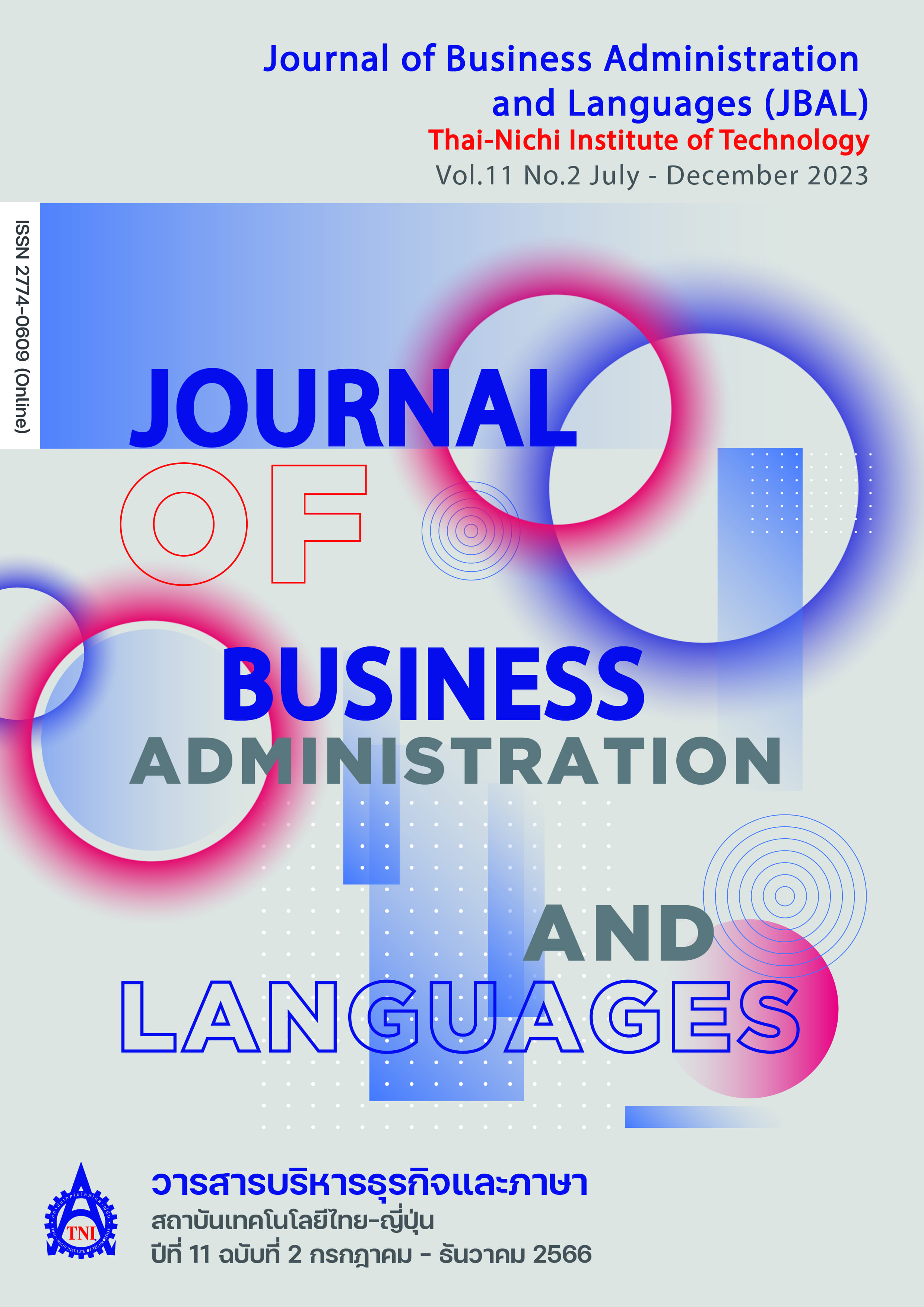กลยุทธ์การตลาดเพื่อเพิ่มยอดขายเวชภัณฑ์ทางการแพทย์ที่มิใช่ยาที่ใช้ในห้องผ่าตัดของหน่วยบริการสุขภาพระดับตติยภูมิในภาคตะวันออกเฉียงเหนือ
Main Article Content
บทคัดย่อ
บทความนี้มีวัตถุประสงค์เพื่อ 1) ศึกษาพฤติกรรมกระบวนการเดินทางตัดสินใจซื้อและปัจจัยส่วนประสมทางการตลาดที่ส่งผลต่อการตัดสินใจซื้อเวชภัณฑ์ทางการแพทย์ที่มิใช่ยา และ 2) เสนอกลยุทธ์การตลาดเพื่อเพิ่มยอดขายเวชภัณฑ์ทางการแพทย์ที่มิใช่ยากลุ่มตัวอย่าง คือ ผู้ที่เคยสั่งซื้อเวชภัณฑ์ทางการแพทย์ที่มิใช่ยาของหน่วยบริการสุขภาพระดับตติยภูมิในภาคตะวันออกเฉียงเหนือ จำนวน 400 คน เครื่องมือที่ใช้ คือ แบบสอบถาม สถิติที่ใช้วิเคราะห์ข้อมูล ได้แก่ ร้อยละ ค่าเฉลี่ย ส่วนเบี่ยงเบนมาตรฐาน และการวิเคราะห์การถดถอยโลจิสติก ร่วมกับการวิเคราะห์สภาพแวดล้อมทั่วไป แรงกดดัน 5 ประการ จุดแข็ง จุดอ่อน โอกาส และภัยคุกคาม และปัจจัยเชิงกลยุทธ์
ผลการศึกษา พบว่า กลุ่มตัวอย่างส่วนใหญ่ให้ความสำคัญกับสินค้ามีคุณภาพและมาตรฐาน ชื่อเสียงกับความน่าเชื่อถือของบริษัท ปัจจัยส่วนประสมทางการตลาดให้ความสำคัญระดับมากที่สุด จำนวน 31 ข้อ กระบวนการเดินทางตัดสินใจซื้อมีความคิดเห็นในระดับเห็นด้วยมากที่สุด จำนวน 23 ข้อ โดยมีปัจจัยส่วนประสมทางการตลาด 7 ปัจจัย ได้แก่ 1) ได้รับข้อมูลจากพนักงานขาย 2) มีการเปรียบเทียบราคาจากหลายบริษัท 3) มีราคาเหมาะสมและใบเสนอราคาเพื่อใช้เปรียบเทียบราคา 4) สินค้ามีคุณภาพสอดคล้องกับความต้องการ 5) หากพึงพอใจในสินค้าและบริการจะทำการจัดซื้อซ้ำ 6) หากพบว่าสินค้ามีคุณภาพสอดคล้องกับความต้องการบอกต่อเพื่อนร่วมงานหรือเครือข่าย 7) หากพึงพอใจในสินค้าและการบริการของจะบอกต่อเพื่อนร่วมงานหรือเครือข่าย ส่งผลต่อการตัดสินใจซื้อเวชภัณฑ์ทางการแพทย์ที่มิใช่ยา จึงได้เสนอกลยุทธ์การตลาดในการเพิ่มยอดขาย 4 โครงการ ได้แก่ 1) Best Performance Employee Award 2) Brand Loyalty Program 3) Co-Creation for Research and Innovation Development และ 4) Business Partner (B2B)
Article Details

อนุญาตภายใต้เงื่อนไข Creative Commons Attribution-NonCommercial-NoDerivatives 4.0 International License.
นโยบายการรับบทความ
กองบรรณาธิการวารสารสถาบันเทคโนโลยีไทย-ญี่ปุ่น มีความยินดีรับบทความจากอาจารย์ นักศึกษา และผู้ทรงคุณวุฒิในสาขาบริหารธุรกิจและภาษา ที่เขียนเป็นภาษาไทยหรือภาษาอังกฤษ ซึ่งผลงานวิชาการที่ส่งมาขอตีพิมพ์ต้องไม่เคยเผยแพร่ในสิ่งพิมพ์อื่นใดมาก่อน และต้องไม่อยู่ในระหว่างการพิจารณาของวารสารอื่นที่นำส่ง ดังนั้นผู้สนใจที่จะร่วมเผยแพร่ผลงานและความรู้ที่ศึกษามาสามารถนำส่งบทความได้ที่กองบรรณาธิการเพื่อเสนอต่อคณะกรรมการกลั่นกรองบทความพิจารณาจัดพิมพ์ในวารสารต่อไป ทั้งนี้บทความที่สามารถเผยแพร่ได้ประกอบด้วยบทความวิจัย ผู้สนใจสามารถศึกษาและจัดเตรียมบทความจากคำแนะนำสำหรับผู้เขียนบทความ
การละเมิดลิขสิทธิ์ถือเป็นความรับผิดชอบของผู้ส่งบทความโดยตรง บทความที่ได้รับการตีพิมพ์ต้องผ่านการพิจารณากลั่นกรองคุณภาพจากผู้ทรงคุณวุฒิและได้รับความเห็นชอบจาก กองบรรณาธิการ
ข้อความที่ปรากฏภายในบทความของแต่ละบทความที่ตีพิมพ์ในวารสารวิชาการเล่มนี้ เป็น ความคิดเห็นส่วนตัวของผู้เขียนแต่ละท่าน ไม่เกี่ยวข้องกับสถาบันเทคโนโลยีไทย-ญี่ปุ่น และคณาจารย์ท่านอื่น ๆ ในสถาบัน แต่อย่างใด ความรับผิดชอบด้านเนื้อหาและการตรวจร่างบทความแต่ละบทความเป็นของผู้เขียนแต่ละท่าน หากมีความผิดพลาดใด ๆ ผู้เขียนแต่ละท่านจะต้องรับผิดชอบบทความของตนเองแต่ผู้เดียว
กองบรรณาธิการขอสงวนสิทธิ์มิให้นำเนื้อหา ทัศนะ หรือข้อคิดเห็นใด ๆ ของบทความในวารสารวิชาการ สถาบันเทคโนโลยีไทย-ญี่ปุ่น ไปเผยแพร่ก่อนได้รับอนุญาตจากผู้นิพนธ์อย่างเป็นลายลักษณ์อักษร ผลงานที่ได้รับการตีพิมพ์ถือเป็นลิขสิทธิ์ของวารสารสถาบันเทคโนโลยีไทย-ญี่ปุ่น
หากต้องการสอบถามข้อมูลเพิ่มเติมที่
- กองบรรณาธิการ วารสารสถาบันเทคโนโลยีไทย-ญี่ปุ่น
- ฝ่ายวิจัยและนวัตกรรม สถาบันเทคโนโลยีไทย-ญี่ปุ่น
เลขที่ 1771/1 สถาบันเทคโนโลยีไทย-ญี่ปุ่น ซอยพัฒนาการ 37-39 ถนนพัฒนาการ แขวงสวนหลวง เขตสวนหลวง กรุงเทพมหานคร 10250 ติดต่อกับคุณพิมพ์รต พิพัฒนกุล (02) 763-2752 , คุณอาริสา จิระเวชถาวร (02) 763-2600 Ext. 2704 Fax. (02) 763-2754 หรือ E-mail: JBAL@tni.ac.th
เอกสารอ้างอิง
Bussaraporn Phokwanyuen, Rawiwong Srithongroong, & Phukit Yonchayawong. (2017). Services marketing mix factors that affecting the purchasing decision in medical equipment of private hospitals in Bangkok metropolitan area (in Thai). SAU Journal of Social Sciences and Humanities, 1(1), 11–29.
Cochran, W. G. (1977). Sampling Techniques (3rd ed.). New York, NY: John Wiley & Sons.
Cronbach, L. J. (1990). Essentials of Psychological Testing (5th ed.). New York, NY: Harper & Row.
Kotler, P., Kartajaya, H., & Setiawan, I. (2021). Marketing 5.0: Technology for Humanity. Hoboken, NJ: John Wiley & Sons.
Kotler, P., & Keller, K. L. (2012). Marketing Management (14th ed.). Upper Saddle River, NJ: Prentice Hall.
Kotler, P., & Keller, K. L. (2021). Marketing Management (16th ed.). London, England: Pearson.
Narin Tunpaiboon. (2020, August 31). Industry Outlook 2020-22: Medical Devices. Retrieved from https://www.krungsri.com/en/research/industry/industry-outlook/other-industries/medical-devices/io/medical-devices
Narin Tunpaiboon. (2021, September 27). Industry Outlook 2021-23: Medical Devices. Retrieved from https://www.krungsri.com/en/research/industry/industry-outlook/other-industries/medical-devices/io/medical-devices-21
Natthaphan Khecharanan. (2022). Strategic Management (in Thai). Bangkok, Thailand: SE-Education.
Pakorn Priyakorn. (2015). Strategic Planning: Concepts and Applied Approach (in Thai). Bangkok, Thailand: GSPA NIDA.
Plastics Institute of Thailand. (2020). Entrepreneur: Product Group - Medical Materials (in Thai). Retrieved from http://medicaldevices.oie.go.th/CompanyList.aspx?tid=2&id=1
Porter, M. E. (2008). The five competitive forces that shape strategy. Harvard Business Review, 86(1), 78–93.
Suraphan Chantadansuwan. (2017). Principles of Business Administration (in Thai). Bangkok, Thailand: Quality Thai Trading.
Thai Health Resource Center. (2021, December 24). Facing the 'Aging Society', the challenge of increasing costs (in Thai). Retrieved from https://bit.ly/4apbfK0


